We wrote about policy impact on this blog in May 2018. Since then we have continued to work with a number of academic staff across BU and with RKEO to support the development of policy impact. But it’s hard – not just for us, but for the academic staff involved.
What is policy impact? This is from the Cambridge University guide: “Making your research agenda and research findings relevant to policymaking in a way that has an impact on how policy is formed, implemented or understood.” And importantly the definition goes on “Whether and how this happens is something that researchers (or groups of researchers) can influence and manage.”. That’s the bit we want to talk about.
[Other guides are available: Nottingham University has one, UCL have a whole set of externally available materials, the LSE impact blog , to name just a few.]
Why is it so hard?
- Because it takes a long time – and who has time to start long term projects?
- Because the effort required is disproportionate to the reward – at least in the short term
- Because the timing NEVER works
- Because politicians are only interested in the things they are interested in – which is not what you’re interested in
- Because politicians want short term results and have short attention spans – and research doesn’t work like that
All of these are probably true. The Cambridge University guide lists reasons to be involved in policy impact – the final one sums up these challenges: “To make your role more interesting and challenging”. It will definitely do that.
Over the last few months we have been privileged to work with staff on some internal projects responding to external requests – and we’ve learnt a lot. In May we wrote “…timing is everything and policy engagement is a two track process – the long term plan to engage those with long term, deep or personal interests in the relevant area, and the short term opportunistic engagement. The most important thing is to start now, including by preparing for the opportunistic engagement. If your issue suddenly becomes topical it will be much easier if you have prepared and don’t have to start writing overnight. And you’re more likely to be heard if people have heard about you and your research before.”. And remember our most important advice for this sort of engagement – to make it easy because no-one (externally) has to listen.
So what happens when we suddenly have to arrange a visit for an external VIP or send some representatives to a round table? We identify the theme or the purpose and then we talk to RKEO, think about the people we know, look at the M&C experts directory and ask around generally, to find the people who have the most relevant and interesting story to tell. And then we make all sorts of trouble for you. We need biographies and briefings for the VIP. We ask you to update your staff profile. We need you to customise your presentations for a lay audience and a 10 minute time slot. We want accessible and visual content, experiential content is even better. We make difficult requests for props and equipment. We need you to rehearse – sometimes not just for us but for representatives from the relevant Department as well, who add all sorts of additional requirements. We probably have to change the timing two or three times. And sometimes the VIP has a better offer or a political crisis comes up and we cancel everything at the last minute. It’s a nightmare.
And what’s the incentive? The visit will go well and the VIP is likely to talk about it in all sorts of situations afterwards. They love doing that – it shows that they are connected: “when I was at…”. They may put you in touch with other people in a way that leads to engagement or collaboration or helps Parliament recognise you as an expert in your field. They may have arrived with one perception of BU and leave with a different one. And there is a direct benefit for the individual academic staff too – because the material you produced is in the bank for next time – and you and we may be able to start using it more widely straight away. We usually follow up with the VIP afterwards. And we will know more about your work and will be better able to support you with policy related matters in the future.
It’s the same with select committee inquiries and government consultations. They come in with a short deadline (about three weeks). They ask questions that are nearly relevant to your research but not quite. They want evidence or responses in a particular format. It always clashes with a project deadline or teaching or marking. They take months to publish the responses – and when it’s evidence to a committee, it has to be an original submission that you have not used for anything else and that you can’t publish anywhere else until after they have published it themselves. They don’t follow up on most submissions. And government consultation responses often acknowledge, but then do not follow, the weight and direction of the responses.
So why should you drop everything to write a response or submit evidence? Because lots of people don’t. We find that often there are only half a dozen direct responses from universities to such things. Many universities rely on the sector bodies or societies to submit weighty responses on their behalf. And that is great, and they may be weighty and have a correspondingly important impact on the outcome. But what if we have something different or interesting to say? What if the committee or the Department is looking for voices that are outside the mainstream? You might only comment on one part of a larger set of questions but have evidence no-one else has. You might agree or disagree with the received wisdom on something but your view and perspective might make readers think twice about their assumptions. And it will get your name and your research out there – you might get called to give evidence or be quoted in the report or response, it may lead to contact in the future when people research the area.
And all of these are steps towards policy impact. So if you’re doing this stuff already, that is great. The people we have worked with at BU have been wonderful – patient, good humoured, responsive and impressive.
And with all this in mind we’d like to recognise, and thank, just a few of those we have bothered recently:
- Hamid Bouchachia
- Christos Gatzidis
- Zulfiqar Khan
- Peter Hills
- Peter Truckel
- Sarah Bate
- Elizabeth Falconer
- Jan Wiener
- Matthew Bennett
- Marcin Budka
- Tom Wainwright
- Vicky Isley
- Paul Smith
- Jian Chang
We’re very grateful. And we really believe that this will be a benefit for you and your work.
And if you’re not doing it, we’d like to add you to our list of candidates for the next opportunity. Please contact us and tell us how your work will make a difference to society and what is the change you want to see as a result of your work. And working with colleagues in RKEO and M&C we will do our best to help you navigate the nightmare and make steps towards seeing that change happen.
PS we have designed a practical workshop on influencing policy makers that you can try. Please contact us to discuss how you might use it.
PPS there are many others we should thank but the list would be too long, including other academic colleagues and colleagues from M&C, RKEO, Estates, IT and elsewhere. You’re all brilliant!
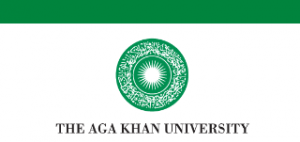 As co-editor of the Journal of Asian Midwives I receive occasional updates from the Aga Khan University (AKU) library in Pakistan on the number of downloads of articles published in the journal. The journal is fully Open Access and does not charge a submission or processing fees! All articles in the Journal of Asian Midwives are stored online in the AKU Institutional Repository. The latest update with data until end of September 2018 informed us that there had been: 18,462 downloads, from 167 countries/regions, across 56 articles. Nearly 20,000 downloads is not bad for a fairly new journal, which only published its inaugural issue online in 2014.
As co-editor of the Journal of Asian Midwives I receive occasional updates from the Aga Khan University (AKU) library in Pakistan on the number of downloads of articles published in the journal. The journal is fully Open Access and does not charge a submission or processing fees! All articles in the Journal of Asian Midwives are stored online in the AKU Institutional Repository. The latest update with data until end of September 2018 informed us that there had been: 18,462 downloads, from 167 countries/regions, across 56 articles. Nearly 20,000 downloads is not bad for a fairly new journal, which only published its inaugural issue online in 2014.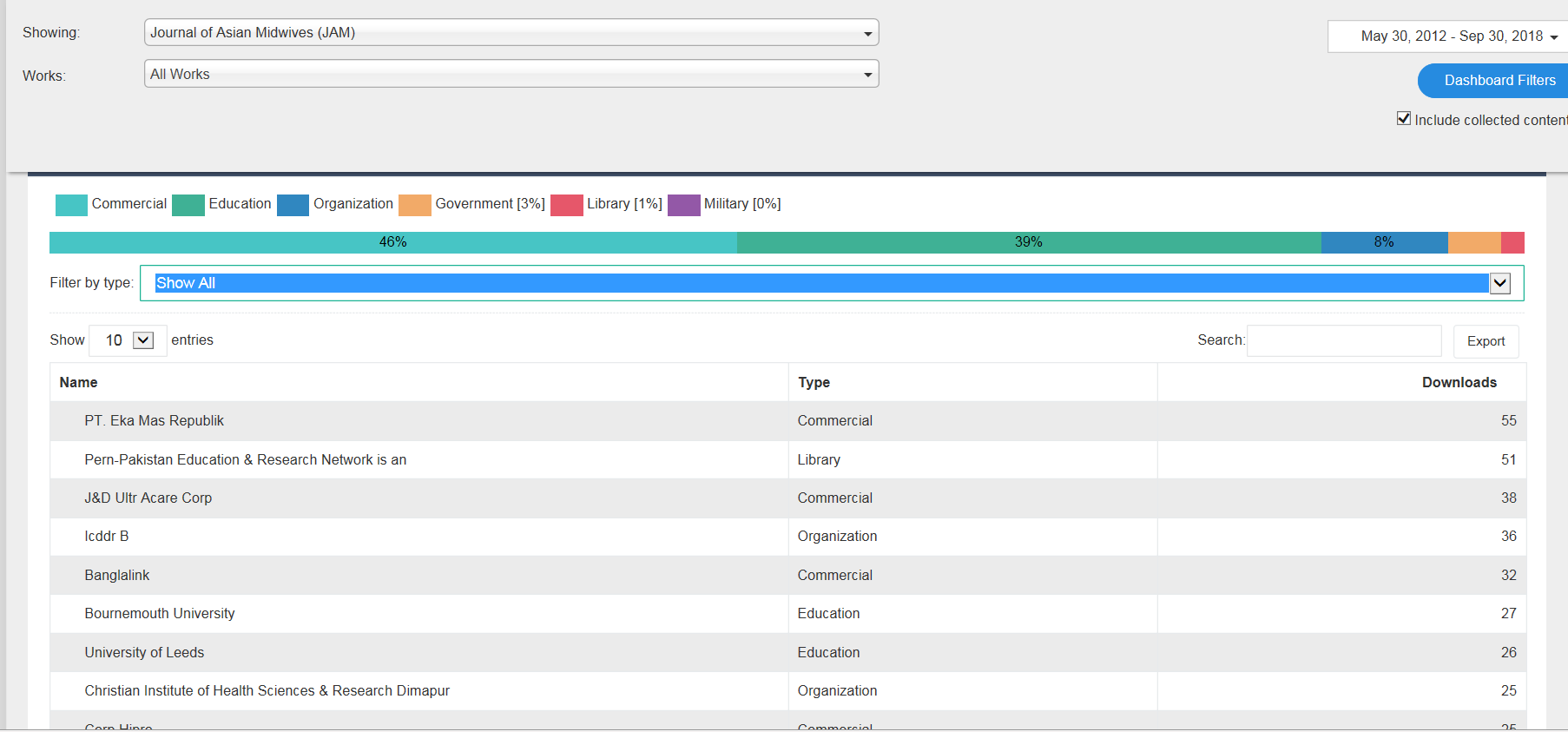 What is interesting is that the detailed download figures show that Bournemouth University is the highest ranking university of all the downloading organisations. Listed as fifth on the download list, Bournemouth is behind two commercial organisations, the Pakistan library network and Bangladesh-based Icddr-B. The latter is one of the largest NGO (Non-Governmental Organisations in the world based on staff numbers. Of course it helps that Bournemouth academic staff and PhD students have published five scientific articles in the past four editions of the journal [1-5].
What is interesting is that the detailed download figures show that Bournemouth University is the highest ranking university of all the downloading organisations. Listed as fifth on the download list, Bournemouth is behind two commercial organisations, the Pakistan library network and Bangladesh-based Icddr-B. The latter is one of the largest NGO (Non-Governmental Organisations in the world based on staff numbers. Of course it helps that Bournemouth academic staff and PhD students have published five scientific articles in the past four editions of the journal [1-5].

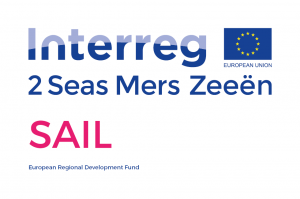 oject is in 4 phases: Explore, Design and Develop, Test and Evaluate. October 2018 will see the SAIL project move into the third phase: Test. The visit to Hunstanton provided an opportunity to see at first hand the challenges which face the area in terms of supporting an aging population now and in the future. The Mayor of Hunstanton hosted an evening reception in the Town Hall to welcome the SAIL Research Team and to learn more about the progress which is being made.
oject is in 4 phases: Explore, Design and Develop, Test and Evaluate. October 2018 will see the SAIL project move into the third phase: Test. The visit to Hunstanton provided an opportunity to see at first hand the challenges which face the area in terms of supporting an aging population now and in the future. The Mayor of Hunstanton hosted an evening reception in the Town Hall to welcome the SAIL Research Team and to learn more about the progress which is being made.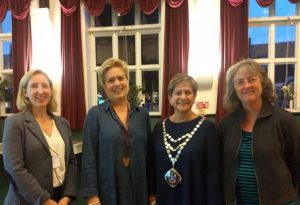
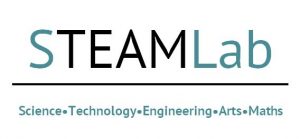
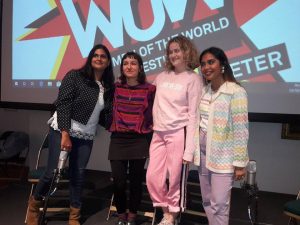
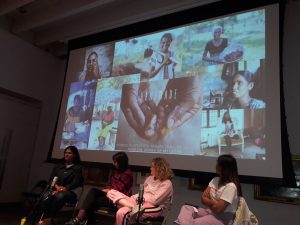




 On Wednesday, 10th October 2018, BU staff had an opportunity to find out more about current EU funding opportunities. Delivered by BU institutional representative in Brussels, Andreas Kontogeorgos, presentations covered such topics as Brexit, forthcoming ICT calls, COST Actions and MSCA Innovative Training Networks.
On Wednesday, 10th October 2018, BU staff had an opportunity to find out more about current EU funding opportunities. Delivered by BU institutional representative in Brussels, Andreas Kontogeorgos, presentations covered such topics as Brexit, forthcoming ICT calls, COST Actions and MSCA Innovative Training Networks. BU staff considering applying for any of these calls and other international funding, should contact international research facilitator Ainar Blaudums or other RKEO’s representatives at their faculties, for further information and support.
BU staff considering applying for any of these calls and other international funding, should contact international research facilitator Ainar Blaudums or other RKEO’s representatives at their faculties, for further information and support. Last week I spent a day up in London at the BBC’s News Centre working with former colleague and BU’s honorary Doctor of Letters
Last week I spent a day up in London at the BBC’s News Centre working with former colleague and BU’s honorary Doctor of Letters 










 Fourth INRC Symposium: From Clinical Applications to Neuro-Inspired Computation
Fourth INRC Symposium: From Clinical Applications to Neuro-Inspired Computation Writing policy briefs
Writing policy briefs Upholding Excellence: The Concordat to Support Research Integrity
Upholding Excellence: The Concordat to Support Research Integrity Today’s Documentation Will Serve Tomorrow’s Justice
Today’s Documentation Will Serve Tomorrow’s Justice ECR Funding Open Call: Research Culture & Community Grant – Application Deadline Friday 12 December
ECR Funding Open Call: Research Culture & Community Grant – Application Deadline Friday 12 December MSCA Postdoctoral Fellowships 2025 Call
MSCA Postdoctoral Fellowships 2025 Call ERC Advanced Grant 2025 Webinar
ERC Advanced Grant 2025 Webinar Horizon Europe Work Programme 2025 Published
Horizon Europe Work Programme 2025 Published Horizon Europe 2025 Work Programme pre-Published
Horizon Europe 2025 Work Programme pre-Published Update on UKRO services
Update on UKRO services European research project exploring use of ‘virtual twins’ to better manage metabolic associated fatty liver disease
European research project exploring use of ‘virtual twins’ to better manage metabolic associated fatty liver disease